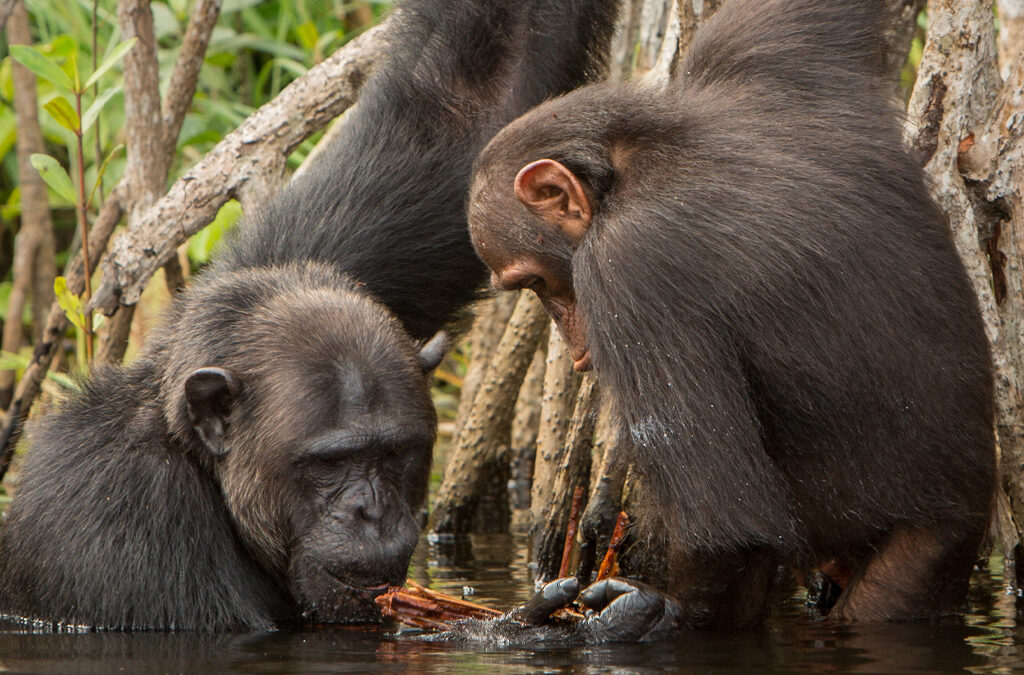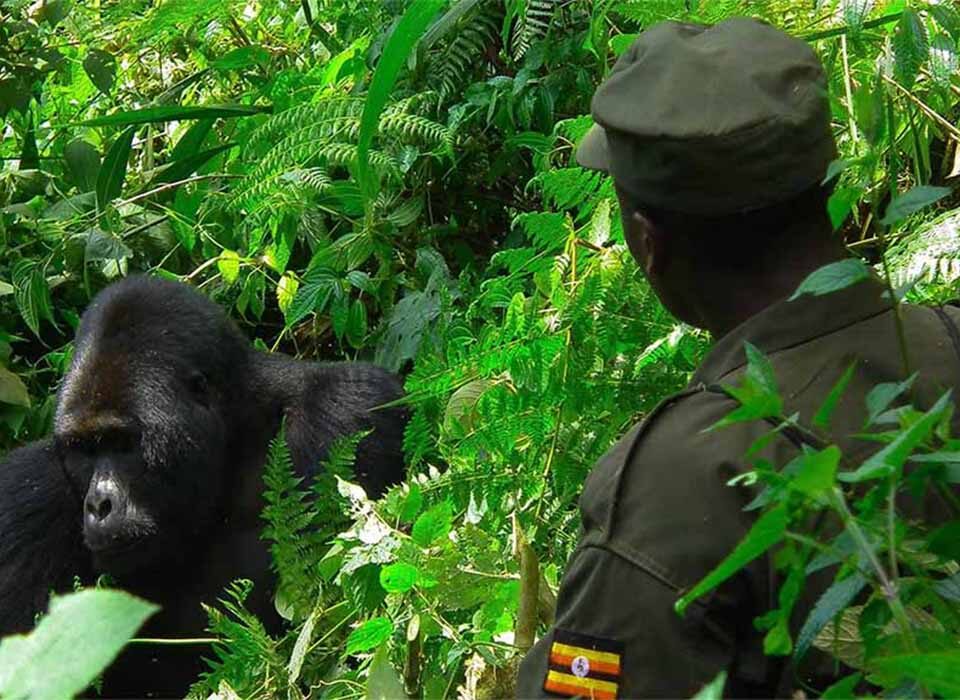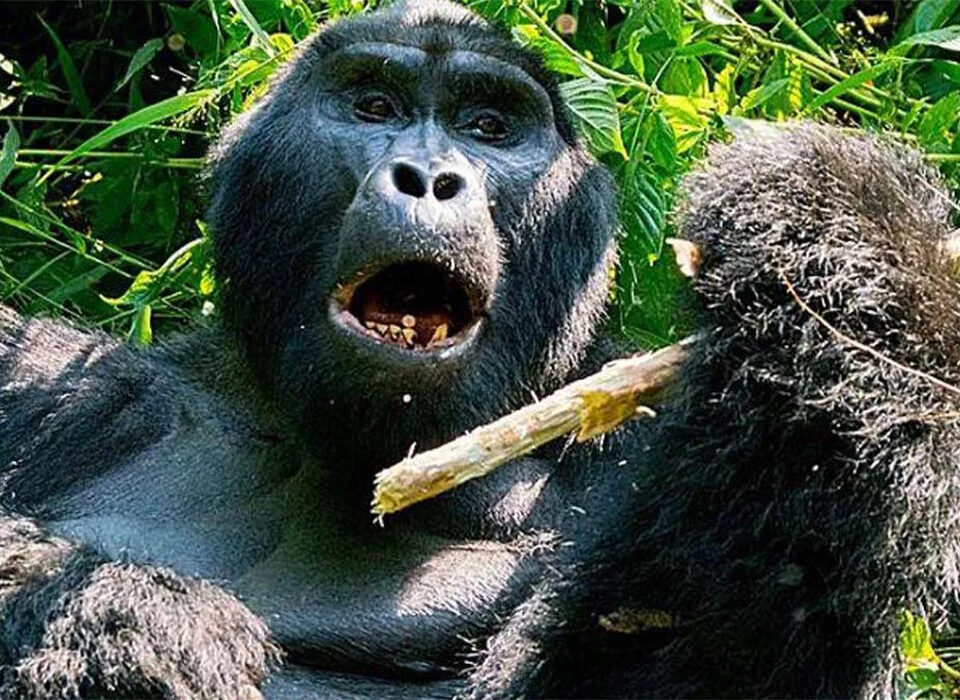
How to Prepare and Plan for a Safari to Murchison Falls National Park
October 8, 202515 Unusual Primate Species Found in Uganda
October 9, 2025Chimpanzee Tracking in Kibale vs Ngamba Island

Chimp tracking in Kibale versus Ngamba Island presents two fundamentally different chimpanzee encounter experiences that travelers can evaluate based on personal preferences, physical abilities, and conservation priorities. Kibale National Park offers an authentic wild chimpanzee trekking adventure through pristine tropical forests, where habituated communities display completely natural behaviors in their native habitat. This creates thrilling, unpredictable wildlife experiences that require moderate physical fitness and active forest navigation.
In contrast, Ngamba Island Chimpanzee Sanctuary provides guaranteed viewing of rescued, semi-captive chimpanzees from comfortable observation platforms during scheduled feeding times. This eliminates physical demands while supporting crucial rehabilitation programs for orphaned and confiscated individuals. Understanding these contrasting experiences helps travelers make informed decisions that match their interests, fitness levels, family composition, and desired intensity of wildlife encounters.
Kibale National Park – Authentic Wild Chimpanzee Trekking
Comprehensive Wild Encounter Experience
Kibale National Park ranks as East Africa’s premier chimpanzee trekking destination, offering exciting and unpredictable wildlife encounters guided by professional trackers. The authentic experience involves hiking deep into the tropical forest while following experts who locate habituated, free-roaming chimpanzee communities by interpreting vocalizations, nest sites, and feeding signs.
Once located, visitors spend an hour observing the chimpanzees’ natural behaviors—feeding, social grooming, tool use, territorial displays, and complex interactions that demonstrate remarkable intelligence. The standard trekking experience provides valuable insights into chimpanzee ecology and behavior, which cannot be replicated in captive settings.
For an even deeper experience, the Chimpanzee Habituation Experience allows visitors to accompany researchers for a full day, observing semi-habituated communities from morning nest departure to evening nest building. This immersive experience offers unparalleled insight into chimpanzee life in the wild.
Natural Wild Chimpanzee Populations
Kibale’s chimpanzees live entirely in the wild, free from human feeding or artificial interference. Decades of careful research have gradually habituated certain communities to human presence without altering their natural behaviors or social structures.
The park is home to over 1,500 chimpanzees across multiple communities, though only a few habituated groups are open for tourism. This high population density supports rich social interactions, territorial competition, and dynamic ecological relationships that visitors can witness during their trek.
Excellent Sighting Probabilities
Kibale offers impressive sighting success rates exceeding 90%, thanks to expert trackers and the large chimpanzee population. Guides depart early each morning to locate the communities, maintaining radio communication to update visitors on their positions. This coordination greatly enhances the chances of a successful encounter while minimizing unnecessary physical exertion.
Moderate Physical Challenge Requirements
Chimpanzee trekking in Kibale demands reasonable physical fitness. Trekkers may need to hike for several hours through dense forest, cross streams, and navigate muddy trails or steep inclines. Conditions can vary depending on the season and chimpanzee movements. Travelers should be prepared for moderate exertion while carrying personal items like water and cameras.
Conservation-Supporting Permit Costs
A Kibale chimpanzee trekking permit costs approximately $250 per person. This fee contributes directly to conservation by funding park management, anti-poaching patrols, research, and local community projects. Although higher than Ngamba’s costs, these funds support an entire ecosystem that protects over 12 primate species, 370 bird species, and countless plant varieties—making it a meaningful investment in biodiversity conservation.
Ideal Visitor Profile
Kibale is perfect for travelers who seek authentic, adventurous, and natural encounters with wild chimpanzees. It appeals to those who embrace the thrill of tracking, the unpredictability of the wild, and the reward of observing chimps in their native environment.
Ngamba Island – Educational Sanctuary Viewing
Comfortable Semi-Captive Observation Experience
Ngamba Island Chimpanzee Sanctuary offers a unique opportunity to observe rescued chimpanzees in a semi-wild environment. Accessible by boat on Lake Victoria, the sanctuary provides comfortable viewing from raised platforms during scheduled feeding times. Visitors watch as caregivers feed the chimps, triggering lively vocalizations, playful climbing, and social interactions that reveal their intelligence and emotions.
Educational sessions led by sanctuary staff explain each chimpanzee’s rescue story, the challenges of rehabilitation, and the broader threats facing chimpanzees—such as habitat loss and the illegal pet trade. This experience combines learning and observation in a relaxed, scenic setting.
Rescued Semi-Captive Chimpanzee Population
Ngamba Island is home to about 50 rescued chimpanzees, many of whom were victims of poaching or the pet trade. These individuals cannot return to the wild due to injuries or lack of survival skills. They live in large forested enclosures where they can forage, climb, and build nests naturally, while caregivers provide supplementary feeding and medical care.
Guaranteed Viewing with Zero Uncertainty
Unlike Kibale’s wild treks, Ngamba guarantees 100% viewing success. The chimps appear reliably during feeding times, making it an ideal choice for travelers with limited time, families with young children, or those who prefer certainty over adventure.
Minimal Physical Requirements
Viewing at Ngamba requires no hiking or strenuous activity. Visitors simply board a boat to the island and watch the chimps from stationary platforms. The experience is suitable for people of all fitness levels, including seniors and children under 12 years old, who cannot participate in Kibale’s treks.
Affordable Conservation Support
Ngamba offers a more affordable experience, with entry fees directly supporting the sanctuary’s operations—such as animal care, veterinary services, habitat management, and public education. These contributions make a tangible difference in the lives of rescued chimpanzees.
Ideal Visitor Profile
Ngamba is ideal for families, elderly visitors, travelers with mobility limitations, and those who prefer relaxed, guaranteed viewing. It also appeals to conservation enthusiasts who want to support chimpanzee welfare and learn about rescue and rehabilitation efforts.
Strategic Selection Guidance
Choose Kibale if you want:
- Authentic wildlife adventures filled with excitement and discovery.
- Close encounters with wild chimpanzees in their natural habitat.
- A physically engaging experience that supports ecosystem conservation.
Choose Ngamba if you want:
- Relaxed, guaranteed chimpanzee viewing without hiking.
- Educational insight into chimp rescue and rehabilitation.
- A family-friendly or mobility-accessible experience.
Both destinations offer unforgettable opportunities to connect with our closest relatives, whether in the untamed forests of Kibale or the compassionate sanctuary of Ngamba Island.
For expert guidance on planning your ideal chimpanzee encounter—whether wild trekking or sanctuary viewing contact Experiya Tour Company for personalized advice and seamless safari coordination.



